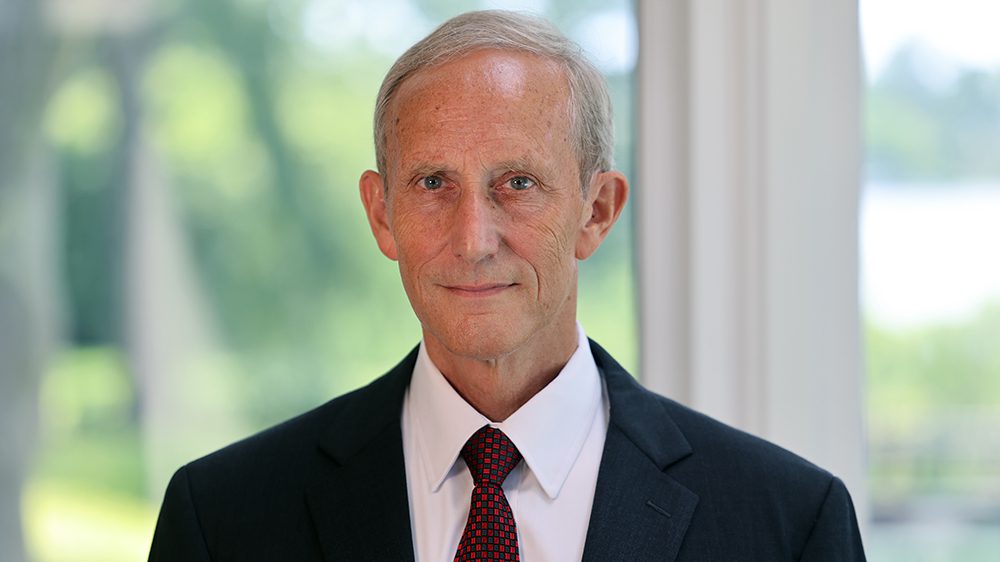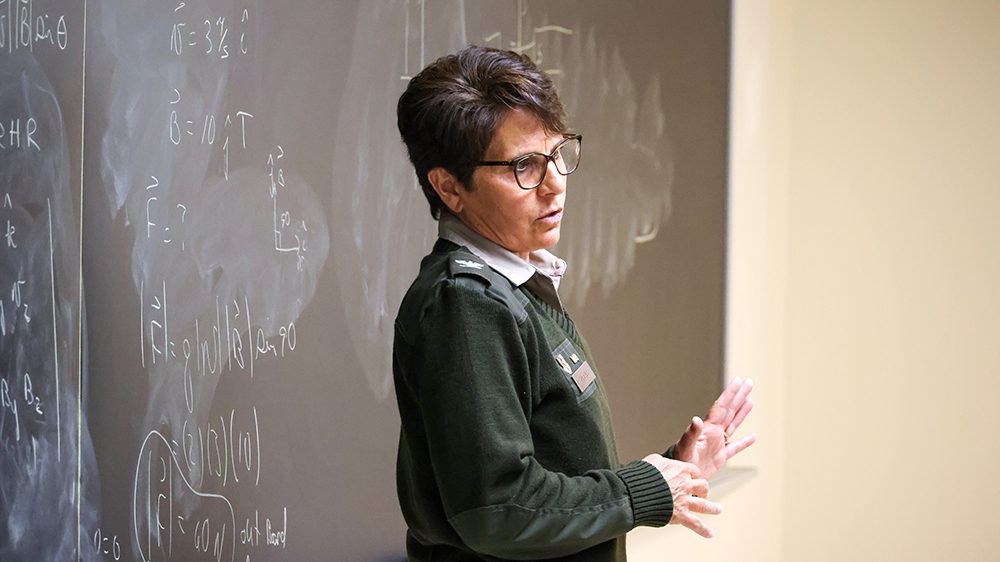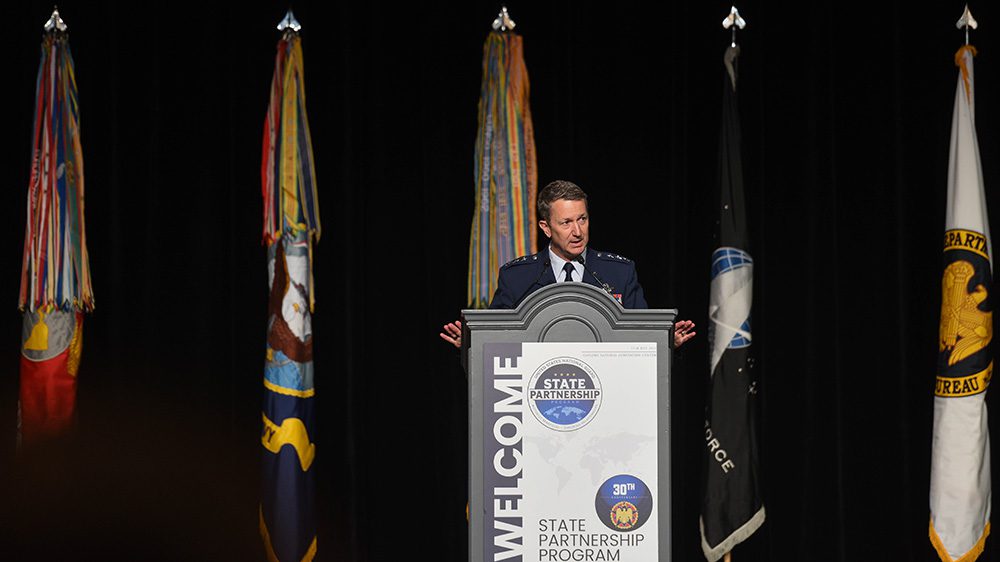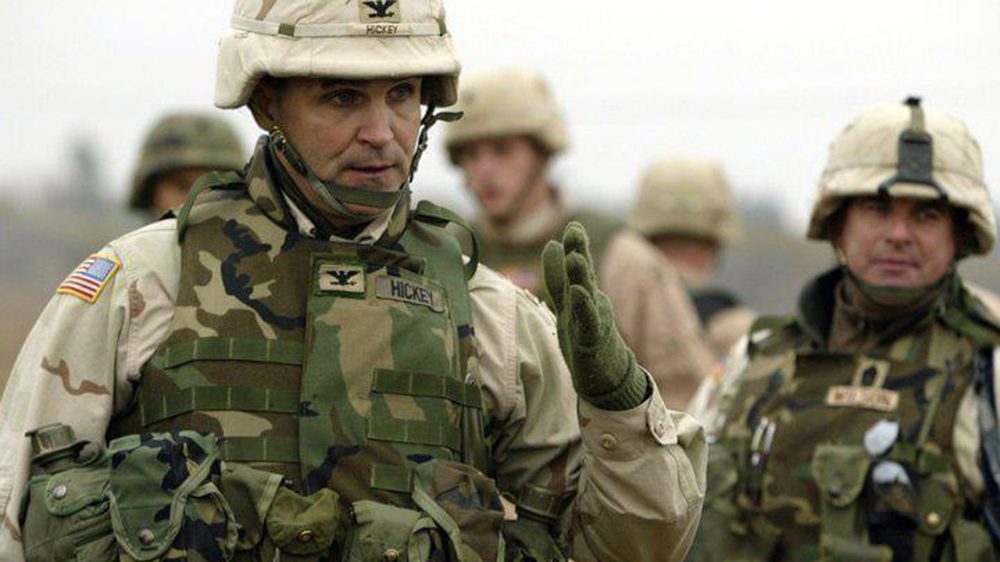In August 2023, John O. Colonna II ’79, M.D., ends 21 years of service as Sentara Norfolk General Hospital’s Renal & Pancreas Transplant Program surgical director and closes a medical career that essentially started when he matriculated at VMI in August 1975. “Right from the start of my cadetship,” he said, “I was set on being a biology major and going to medical school.” Much of his determination was based on the stories his mother would tell after work. She had become a nurse after many years as a hospital volunteer. Colonna said these stories made a medical career “seem so interesting.”
His father, grandfather, great-grandfather, and uncle were VMI alumni, but Colonna never felt any pressure to attend the Institute. It was an encounter with an admissions representative at a college night at his local high school that drew him to VMI. “I can’t remember his name or exactly what he said,” recalled Colonna, “but what came across was that VMI was a small school that took a much more personal approach to education than the bigger schools. By the time he finished, I thought, ‘Yeah, that’s the place for me.’”
In the biology department, Colonna encountered professors who were demanding yet caring. Another inspiration for Colonna was the example of his brother rats. “We kind of drove each other,” said Colonna. Besides Colonna, four of the class’ 15 biology majors—Raymond Duffett, M.D.; Daniel Foster, M.D.; Dolphin Overton III, M.D.; and Robert L. Norris Jr., M.D.—pursued medical careers. Another became a dentist, and many of the others received advanced degrees and are scientists, teachers, or work in some aspect of health care. “All of them were impressive, but Bob [Norris] was the best of us. He received the Hughes Award as the top Army ROTC cadet in the country. He was a First Jackson-Hope Medal winner with a perfect 4.0, was the president of the Honor Court, and commanded Echo Company.”
Colonna’s record was admirable, too. He was a distinguished graduate, a distinguished military graduate, and a distinguished military student. He held rank for three years, serving as a cadet first lieutenant as a 1st Class cadet. He was involved with the Cadet Program Board, the Cadet Activities Committee, and the Pre-Med Society. After marrying his high school and VMI sweetheart, Teresa Bledsoe, Colonna entered the Medical College of Virginia, now known as Virginia Commonwealth University School of Medicine, along with Norris and Foster. At MCV, he realized his VMI experience “had prepared me very well” for medical school’s demands.
“At VMI, you learn the importance of delayed gratification, that hard work and diligence will pay off down the road. You learn how to budget your time and develop self-discipline.” That would have been enough to ensure Colonna’s success at MCV, but something else spurred his performance. “Wherever we go, alumni have a responsibility to do well, as it can open doors for those who follow [you] into barracks, to do well. … Also, at places like MCV, where VMI alumni have consistently performed well, people have elevated expectations of us, and you need to live up to them. I think Bob, Dan, and I did just that.”
Until his third year, known as “the first clinical year,” Colonna was unsure about a specialty. It was during the eight-week surgical rotation that his path became clear. “This will sound funny after what I said about delayed gratification, but surgery provides a sense of immediate gratification because you can fix problems quickly.” Two weeks observing transplant surgery further sharpened his focus. “When the clamps are taken off a transplanted organ, and you see it start to function; well, there’s nothing like it.” In recognition of his skills during his fourth and final year at MCV, the school presented him with its Surgery Book Award, which honors the top student in surgery. He was also inducted into the national medical school honor society Alpha Omega Alpha.
Colonna’s next stop was the University of California–Los Angeles. From 1983–85, he did a residency in general surgery, which he followed with a two-year research fellowship in transplantation. He continued his surgical residency from 1987–89 and was chief resident in general surgery from 1989–90. In 1990, Colonna received the Wilma Miley Morton Award for Research and the Golden Scalpel Award for Teaching Excellence. He then embarked on a two-year clinical fellowship in liver transplantation.
“That fellowship was sponsored by the Army, which was great because I was paid by the Army,” he said. In 1992, Colonna completed his training and began his clinical career and Army service at Walter Reed Army Medical Center. There, he directed its liver transplant program, performed the Army’s first liver transplant, and worked next door to his mother, who was the nurse in charge of the blood and platelet donation center. For his work, Colonna received the Meritorious Service Medal and the Army Commendation Medal.
In 1998, Colonna became the University of Maryland Medical System director of Liver Transplantation & Hepatobiliary Surgery. It was quite a change. “The University of Maryland was—and is—a leading center for transplant surgery. When I was there, we performed an average of 500 kidney, liver, and pancreas transplants annually,” said Colonna. “It was busy, but it was also exciting and rewarding.”
“[A]lumni have a responsibility, especially to others who will follow you into barracks, to do well.”
John O. Colonna II ’79, M.D.
Four years later, Colonna learned that Sentara Norfolk General Hospital was looking for a surgical director for its renal and pancreas transplant program. “My wife had attended William & Mary, and we both liked the area. We agreed that if we didn’t go now, we never would. I had to give up liver transplants, but I have never regretted it.” Colonna pointed out that the program at Norfolk General was a good fit in another way: There was a VMI connection. “The founder and first leader of the transplant unit—which just celebrated its 50th anniversary—was Doctor Jock Wheeler ’54.” In addition, Tom McCune ’82, M.D., has been one of the lead nephrologists and the primary clinical investigator for the program since 1991.
During his career, Colonna has participated in approximately 1,700 kidney transplants, 350 liver transplants, 125 pancreas transplants, and 1,200 organ recovery procedures. Asked if, at some point, his work ever seemed routine, he replied, “Some aspects of it do—the administrative work, for instance—but every case has its own nuances and challenges. For example, organ recovery—that is, removing organs for transplantation from donors, living or dead—you encounter every variant of anatomy. Every time you think you’ve seen it all, you see something new.”
It is hard to believe considering his workload as a surgeon, but for much of his career, Colonna has also been a teacher, a researcher, and an author. On top of his work with surgical residents, he has been an associate professor of surgery at the University of Maryland School of Medicine, the Uniformed Services University for Health Sciences, and the Eastern Virginia Medical School (where he also has been an associate professor of urology). “It’s one of the best parts of my job. There is something special about passing on what you know to younger generations and knowing others will use the knowledge you have acquired.” During his research fellowship at UCLA, Colonna began writing. “At a big transplant program like UCLA, there are always things to pass on, and we are always learning new ways to do things. We have an obligation to help patients, and so we have an obligation to share whatever we know will help them as widely as possible. It’s a two-way street, so we all learn from each other.” In total, he published seven book chapters and more than 50 articles.
What has he valued about his career? “It is very fulfilling being in healthcare, no matter what you do, because you help people. You make things right.” What about being a transplant surgeon? “I have had a tremendous career. Transplant surgeons make a profound difference in people’s lives. A liver transplant saves a life, and a kidney transplant transforms a life. That’s incredibly gratifying. Transplants are only made possible through the ‘gift of life’ made by living donors and the families of deceased donors. Being trusted to participate in the passing on of these gifts is both a tremendous privilege and responsibility. I’ve also had fun developing great relationships with my patients during long-term, post-transplant care. Yes, there are downsides to it—primarily a lot of operations in the middle of the night—but the rewards far outweigh them. I just can’t imagine doing anything else.”
When asked what lessons from his VMI experience he has applied in his career, he replied, “Honor, integrity, and a good work ethic are the most important. You cannot lie in medicine, and you can’t be lazy; there is just too much at stake.” He continued, “A lot of VMI is about teamwork. As a cadet, you quickly come to understand its value, and you come to value every member of the team. It takes a big team—nurses, medical techs, pharmacists, surgeons, nephrologists, and many other specialists—doing a lot of jobs to ensure a successful transplant. So, what I learned about team dynamics as a cadet has been especially useful to me as a physician.”
How does he see his retirement? “In May 1974, Teresa and I had our first date and have been a couple ever since. I cannot begin to imagine what my life would have been like without her. I’m not sure how to thank her for all the sacrifices she has made for me and our family over almost 50 years, but that will be my primary goal in retirement. Despite being a double major at William & Mary (and earning Phi Beta Kappa induction), Teresa wrote me several letters a week which kept me going. She attended all but one hop, and she was my Ring Figure date. While I was at MCV, she worked for C&P Telephone and was our sole source of support. She worked at Pacific Bell during my UCLA years until 1990 when our third son was born. For my two-year transplant surgery fellowship, she was basically a single mother. Every excellent quality that our five children have comes from her. She also always made sure church life was a priority for our family. For decades, she has prayed for me and our family every night, and we have all benefited from her prayers. I am not sure I can make up for 50 years of things mostly being about me and my career, but that is my goal.”
-
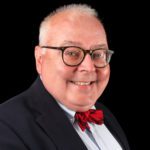
Scott Belliveau '83 Communications Officer - Executive Projects
The communications officer supports the strategy for all communications, including web content, public relations messages and collateral pieces in order to articulate and promote the mission of the VMI Alumni Agencies and promote philanthropy among varied constituencies.

Christian Heilman Senior Director of Digital Strategy
The senior director of digital strategy is responsible for creating original video and multimedia materials, as well as developing and editing web and digital content. The senior director is responsible for platform coordination and troubleshooting, to include the VMI Alumni Agencies’ primary websites, digital newsletter and other digital platforms.

